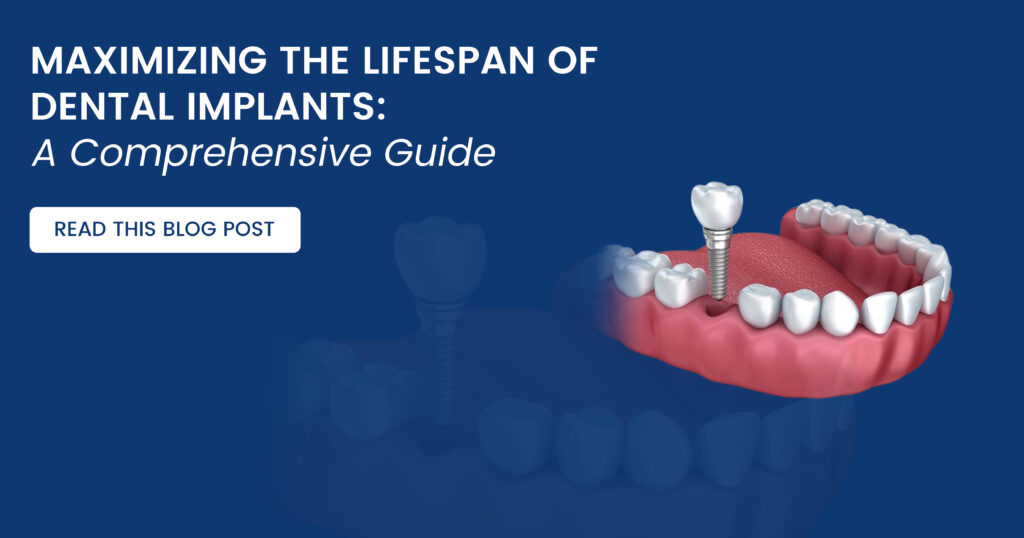
Introduction
Dental implants are a new way to replace missing teeth. They are permanent and improve how your teeth look and your oral health. One common query among prospective candidates revolves around the longevity of these implants.
In this post, we look at what affects how long dental implants last and give tips on making them last longer.
Understanding Dental Implants
Before delving into their lifespan, it’s crucial to grasp the fundamentals of dental implants. Prosthetic tooth roots made of titanium or zirconia are implanted into the jawbone to support artificial teeth called crowns.
Dental implants are known for looking and working like real teeth. They also help maintain facial structure by preventing jawbone loss.
Factors Influencing Dental Implants Longevity
The lifespan of dental implants varies considerably based on several factors, including:
- Oral Hygiene: Rigorous oral hygiene practices, encompassing regular brushing, flossing, and antimicrobial mouthwash use, are instrumental in preventing plaque buildup and preserving implant health.
- Routine Dental Check-ups: Consistent dental evaluations facilitate early detection and resolution of potential issues, ensuring the longevity of dental implants. Smoking and drinking too much alcohol can harm dental implants. This is because they increase the risk of gum disease. Gum disease is a common reason for implant failure.
- Overall Health: Systemic conditions like diabetes and autoimmune disorders can impede the body’s healing processes, potentially compromising the success and durability of dental. It is important to eat a balanced diet that includes calcium, vitamin C, and protein for good oral health.
- This will also help dental fuse with the jawbone. Adequate calcium intake is particularly important for bone density, which is crucial for the stability of dental implants.
- Avoid hard foods like ice, nuts, and hard candies to prevent damage or loosening of dental implants due to excessive pressure. It’s advisable to avoid such foods or exercise caution when consuming them to prevent complications.
- Proper Implant Care Techniques: In addition to routine oral hygiene practices, individuals with dental implants should be mindful of specific care techniques recommended by their dentist or oral surgeon. This may include using specialized brushes or tools to clean around the implants gently, as well as following any post-operative care instructions provided.
- Managing Stress: Chronic stress can weaken the immune system and hinder the body’s ability to heal properly, which can have implications for the success of dental implant procedures. Implementing stress-reducing techniques such as mindfulness, exercise, or relaxation techniques may support overall health and contribute to the favorable outcome of implant treatment.
- Regular Exercise: Engaging in regular physical activity promotes circulation and overall well-being, which can indirectly benefit dental implant health by supporting the body’s natural healing processes. Exercise helps keep a healthy weight, lowering risks like gum disease and implant failure linked to obesity.
- Medication Management: Some medications, such as certain antibiotics and blood thinners, can affect dental implant healing and integration. It’s important for people getting implants to tell their dentist or oral surgeon about any medications they take. This helps with proper care and reduces risks.
- Professional Teeth Cleaning: Regular professional cleanings by a dental hygienist help remove plaque and tartar buildup around implants, reducing the risk of gum disease and implant failure. These cleanings also provide an opportunity for the dental team to assess the health of the implants and address any concerns promptly.
- Awareness of Warning Signs: Being vigilant about any changes or discomfort around dental is crucial. Persistent pain, swelling, or bleeding in the gums. As well as mobility or looseness of the implant, should prompt immediate evaluation by a dental professional.
Maximizing Dentals Implants Lifespan
To optimize the lifespan of implants, adhere to these best practices:
- To keep your mouth clean, brush your teeth twice a day with a soft toothbrush. Floss often to remove food particles and plaque. Use mouthwash to prevent bacteria buildup and maintain fresh breath.
- Schedule Regular Dental Visits: Routine dental appointments facilitate thorough cleaning and monitoring of implant health, ensuring early intervention if issues arise.
- Stay away from smoking and drinking too much alcohol to reduce the chance of gum disease and other mouth problems.
Conclusion
Dental implants are a big investment for your smile and health. With good care, they can last a lifetime. While individual outcomes may vary, understanding the determinants of implant longevity and adopting proactive oral care measures can substantially enhance their durability.
To keep dental implants looking good, focus on oral hygiene. Make sure to see the dentist regularly. Also, make healthy choices.
Following these steps will help maintain a bright smile. This will help maintain a bright smile.
